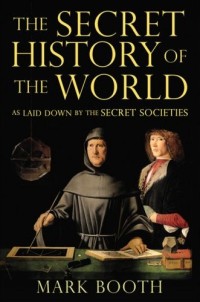The Secret History of the World as Laid Down by the Secret Societies

 By Mark Booth
By Mark Booth
2008 Peter Mayer Publishers, Overlook Press, Woodstock, NY. The Kindle edition Click to Buy this Book!
Synthesizing all the esoteric thinking since the dawn of time is not a task most of us would undertake. Even if we could. Decoding the mysticism lurking in literature, art, music, religion, alchemy, history and philosophy in order to present a coherent and readable overview of what we humans have been confronting for eons … who, in their right mind would even attempt that?
Mark Booth, as it turns out.
He’s a publisher-author-avid reader. This is a compilation of at least twenty years of reading the books listed in the extensive bibliography (reason enough to buy this book) as well as actually commissioning and publishing many of them. Booth’s knowledge makes The Secret History of the World extremely fascinating and enlightening reading.
After centuries of mystery schools and initiations, Booth summarizes at the end, we now know it’s really quite simple. Imagination is the key to realizing our soul-force. Materialistic science, on the other hand, would say imagination is just illusion and fantasy.
Plato once said, “It all starts with wonder.” Wonder, Booth claims, is transformed feeling that is aware of the spiritual workings of the cosmos. We’re intimately engaged in a four-fold process involving our vegetable, mineral, animal and human bodies which eventually become angelic. We all sprout wings! And when we change our human physiology we become seeds of transformation for the entire universe, for we are, indeed, intimately connected to all that is.
The Apostle Paul had the right idea in I Corinthians. It all comes down to faith, hope and love — the greatest of these being love. What we’ve learned — at least up to now — is that if some of us are unhappy, we’re all going to be unhappy. And if we’re not careful, evil will harden us into only our animal passions.
Change throughout history, Booth notes, comes, not from generals and politicians, but through artists and thinkers. Through writers and musicians and oral traditions. And through all those people, known and unknown, who have kept the traditions alive. More »